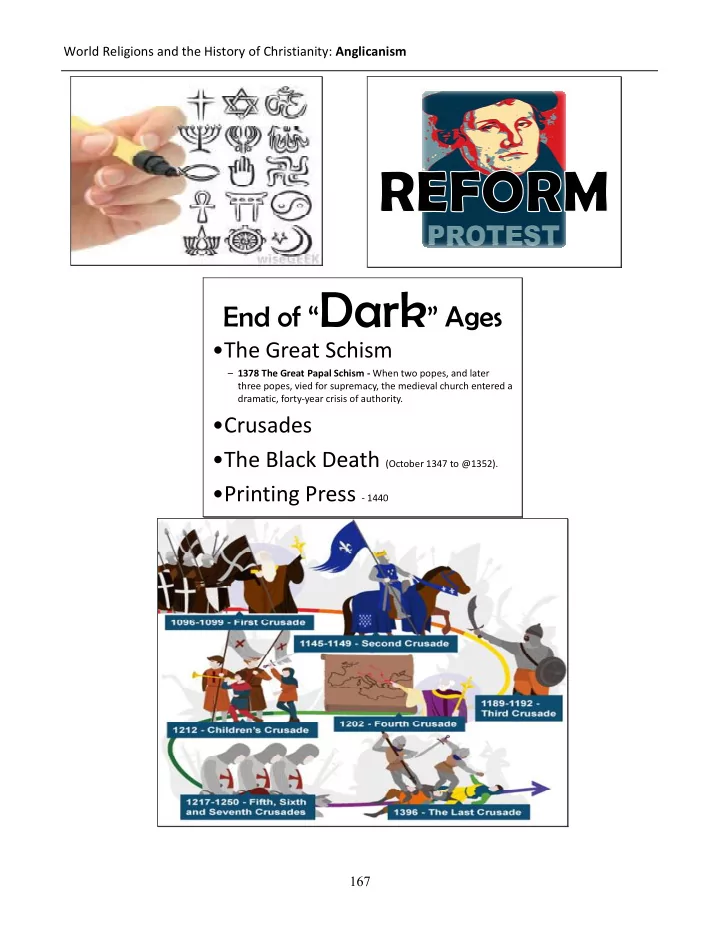

World Religions and the History of Christianity: Anglicanism �������� ���� ������ •The Great Schism – 1378 The Great Papal Schism - When two popes, and later three popes, vied for supremacy, the medieval church entered a dramatic, forty-year crisis of authority. •Crusades •The Black Death (October 1347 to @1352). •Printing Press - 1440 167
World Religions and the History of Christianity: Anglicanism Causes of the Reformation Social Political Economic Religious • The • Powerful • European • Some Church Renaissance monarchs princes and leaders had values of challenged the kings were become humanism and Church as the jealous of the worldly and secularism led supreme Church’s corrupt. • Many people people to power in wealth. • Merchants question the Europe. found Church • Many leaders Church. and others practices such • The printing viewed the resented as the sale of press helped to pope as a having to pay indulgences spread ideas foreign ruler taxes to the unacceptable. critical of the and challenged Church. Church. his authority. 168
World Religions and the History of Christianity: Anglicanism 169
World Religions and the History of Christianity: Anglicanism ��������� • Thomas Cranmer (1489-1556): Archbishop of Canterbury during the reigns of the English kings Henry VIII and Edward VI. • William Wilberforce: British politician responsible for abolishing slavery • The Clapham Sect: astonishingly influential evangelical Anglican social reformers • George Frederic Handel: Composer (The Messiah, etc.) • C. S. Lewis: author of e.g. Chronicles of Narnia, and Mere Christianity • J. I. Packer: evangelical theologian / author • J.C. Ryle • Alister McGrath: theologian and author • Bishop Desmond Tutu: Nobel Peace Prize winner, South African reconciliationist • John Stott: evangelical and co-framer of the Lausanne Covenant • Nicky Gumbel: founder of Alpha Course, a friendship evangelism concept. • N.T. Wright: theologian and Bishop of Durham • George Bush (the elder): U.S. President (1989-1993) • Colin Powell: General (USA) and US Secretary of State (2001) • Henry VIII 170
World Religions and the History of Christianity: Anglicanism ��������� � • Anglicans base their Christian faith on the Bible, traditions of the apostolic Church, apostolic succession ("historic episcopate"), and writings of the Church Fathers. • It is sometimes seen as being the middle way, between Roman Catholicism and extreme Protestantism. This is because, in the English Reformation, the English Church kept the early Catholic ministry of bishops, priests, and deacons. The critical point which led to the Anglican Church was the outright rejection of the Pope, and so of the Catholic Church as an organization. • Anglicanism is the general name for the Church of England and includes other churches worldwide with a connection to the Church of England, notably within the Anglican Communion. • The key document that distinguishes Anglicans from other denominations is the Book of Common Prayer which specifies, for example: o The supremacy of Scripture in all matters of theology o Concurrence with the Apostles' Creed and the Nicene Creed o Liturgies for regular services such as Holy Communion, Morning Prayer, and Evensong o Liturgies for special events such as Baptisms, Marriages, Funerals, and Ordination of clergy o A table of Bible readings for every day of the year o Thirty-nine Articles of religion that clarify how Anglican theology and practice differed from Roman Catholic theology and practice in 1662. 171
World Religions and the History of Christianity: Anglicanism ���������� ���������� •“The episcopate is the •“The historical episcopate comprises all the bishops who collective body of all the are in valid apostolic succession. bishops of a church. The term This succession is transmitted is also used to refer to the from each bishop to their status or term in office of an successors by the rite of Holy individual bishop.” Orders.” �������� �������� • “ One canon reduced to writing by God •Anglicanism in the United States himself, two testaments , three creeds , is represented by the Episcopal four general councils , five centuries , Church which is part of the and the series of Fathers in that period Anglican Communion and which – the centuries that is, before Constantine, and two after , determine takes its name from the the boundary of our faith.” Episcopalian form of its polity. –Lancelot Andrewes 172
World Religions and the History of Christianity: Anglicanism �������� �������� • Anglicans claim an unbroken line of • Sin and Justification Apostolic Succession from the 12 • Anglicans believe human beings are Apostles. Each bishop is ordained born into original sin. This means through the laying on of hands of other people have a natural tendency to bishops and Anglicans believe that this disobey God. They believe that God tradition represents a thread back punishes sin via an eternity in hell, and through the pre-reformation Roman that every person deserves that church to Jesus Himself. punishment. �������� �������� • They also believe that the death of • Like other Christians, Anglicans refer to this by many terms such as "salvation," Jesus Christ on the cross provides a pardon for sinful humanity. Those "justification" and "redemption." people who believe in Jesus Christ and repent are justified before God through Christ's work and receive a heavenly reward, in Anglican doctrine. �������� �������� • The Sacraments • Anglicans also refer to the Lord's Supper as Holy Communion or the Eucharist. • Baptism and the Lord's Supper are the They reject the Roman Catholic view of two sacraments Protestant churches the Eucharist, in which the bread and typically practice. Anglicans are no wine are transformed invisibly and exception. Anglicans believe that the literally into the body and blood of sacraments are signs of God's grace, Christ. through which God works invisibly to strengthen the believer's faith. 173
World Religions and the History of Christianity: Anglicanism ����� ����� •Anglican Churches in the •The majority of Anglicans United States, Canada, and however are in the "Global to a lesser extent Great South" (Africa, Asia, Britain are currently Australia) where orthodoxy dominated by liberal is dominant. bishops. 174
Recommend
More recommend